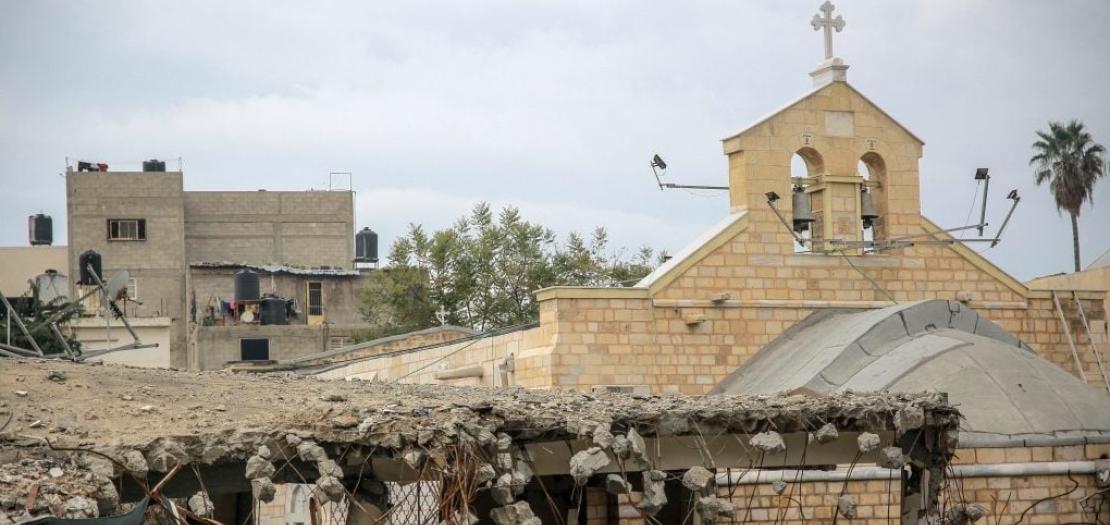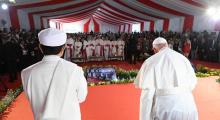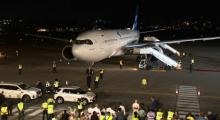Issued by the Catholic Center for Studies and Media - Jordan. Editor-in-chief Fr. Rif'at Bader - موقع أبونا abouna.org

“You are the God who sees me.” (Genesis 16:13)
The executive committee of the World Council of Churches (WCC), meeting in Bogotá, Colombia, on 6-11 June 2024, lifts up the suffering of the civilian population of Gaza in the midst of the ongoing attacks in the territory, with a death toll now surpassing 36,000 people, over two-thirds of them children and women, more than 83 per cent of the population displaced (in most cases repeatedly), the complete destruction of medical, educational, and other civilian infrastructure, with more than 50 per cent of homes destroyed, leaving over one million people homeless. These statistics provide compelling witness of the indiscriminate nature of the Israeli military actions in the territory, and of the lack of respect for fundamental principles of international humanitarian law and morality. Moreover, underlying these anonymous statistics, are all the children, women and men of Gaza whose lives, livelihoods, families, communities, hopes and aspirations have been destroyed in this brutal war.
The number of civilians killed, injured and displaced is on the rise every day. In particular, Gaza’s children are paying the heaviest price of the war. More than 14,000 children have reportedly been killed, while thousands more have been severely injured, maimed and orphaned. Gaza now has the largest cohort of paediatric amputees in the world. There are no safe places for Gaza’s children. All have been exposed to the traumatic experiences of war and loss, the consequences of which will be lifelong and intergenerational.
More than two million people in Gaza – almost its entire population – are in urgent need of humanitarian and medical aid. People across the entire territory are currently facing the threat of famine and increasingly high rates of acute malnutrition and starvation. Meanwhile, humanitarian access and the delivery of critically-needed aid to the people of Gaza continues to be hindered and obstructed.
UNRWA – the UN Relief and Works Agency for Palestinian Refugees in the Near East – has been the main supplier of food, water and shelter to civilians in Gaza during this war, with 87% of Gaza’s people dependent upon these essential services. However, the government of Israel has sought to demonize UNRWA, and to add it to the list of terrorist organizations. In addition, withdrawal of funding by key international community donors – especially the United States – following allegations of involvement by 12 UNRWA staff in the 7 October attacks has gravely threatened this lifeline for Gaza’s people in the midst of this war. Though some donors have since resumed funding to UNRWA, others have not, threatening an even deeper humanitarian catastrophe in the region.
In response, ACT Alliance – through its local members – as well as the churches of the region have stepped in to provide essential humanitarian aid, health services, and psychosocial support, playing a vital role in alleviating the suffering of the affected population.
The nature of the war, the enormity of the impacts on the people of Gaza, and statements made by Israeli leaders, have given rise to accusations of genocidal intent. As the WCC general secretary has asserted, those claims warrant adjudication by the relevant organs of international law, i.e. the International Court of Justice (ICJ) and the International Criminal Court (ICC).
Moreover, we recall that WCC was one of the key partners of the Office of the UN Special Adviser on the Prevention of Genocide in the drafting of the Plan of Action for Religious Leaders and Actors to Prevent Incitement to Violence that Could Lead to Atrocity Crimes (‘the Fez Process’) which, inter alia, seeks to engage religious leaders and actors in effective measures to prevent atrocity crimes (genocide, war crimes and crimes against humanity) worldwide, especially in areas affected by religious and sectarian tensions and violence.
Despite international calls for an immediate ceasefire (including from the WCC and many churches around the world), provisional orders by the ICJ, and UN Security Council Resolution 2728 (2024), Israel has continued – in the name of defeating Hamas following the attacks of 7 October 2023 – to conduct military attacks that produce appalling suffering for Palestinian people and communities throughout Gaza, most recently in Rafah where so many displaced Palestinians had been directed for safe refuge, as well as humanitarian workers. In these circumstances, an arms embargo and economic sanctions must be considered as means to stop the bloodshed and destruction of Gaza.
We uphold the God-given sanctity of life, and abhor the loss of so many precious lives, both Palestinian and Israeli. We reaffirm our belief in justice as the essential foundation for sustainable peace and reconciliation. Particularly in the evident absence of political will on the part of governments in the region and around the world, we believe that the churches and faith communities have an essential prophetic role in promoting justice, human rights and dignity, self-determination, democracy, and peace throughout the region.
We applaud and stand in solidarity with the movements of people around the world, especially among the young, who bravely and persistently raise their voices against war, war crimes, and the threat of genocide, ecocide and ‘scholasticide’, and stand up for a just peace that makes peaceful coexistence for both Palestinians and Israelis possible. We deeply regret that in several educational institutions where student protests against the war emerged, administrators have bowed to political pressure to respond to such protests with draconian and excessive measures.
We firmly assert that sustainable security of all people in the region depends on the establishment of a just and comprehensive peace, founded upon respect for and accountability to international law. The current conflict is driving an escalating crisis throughout the region. In particular, though less visible in the international arena, in the West Bank we are witnessing unprecedented high levels of violence from the occupation, against Palestinian civilians, schools and communities by settlers with the support of Israeli armed forces, with greatly increased numbers of arbitrary arrests, and closure of access to all Palestinian villages.
The lack of respect for international law is also reflected in the nature of the Hamas attacks on 7 October 2023, based on reports of “the most extreme and inhumane forms of killing, torture and other horrors, including sexual violence” as well as instances of sexual violence by Israeli authorities against Palestinian detainees in the West Bank.
Against the background of this continuing and unchecked violence and injustice, we reiterate the concern we expressed at our meeting in November 2023 about the proliferation of hateful acts against Jews, Arabs and Muslims around the world. We condemn any and all attacks on Jews who are falsely held responsible for the actions of the government of Israel.
In a spirit of moral urgency founded upon the faith that binds us together, we:
Call upon all parties involved to immediately commit to a permanent ceasefire in Gaza, to ensure unhindered humanitarian access from all borders and the delivery of sufficient quantities of aid to all those who need it, and to engage in meaningful political processes that allow the peoples of the region to live in peace and dignity. It is imperative that all actions respect the sanctity of human life and prioritize the protection of civilians, ensuring their safety, security, and their right to return to their own homes and land.
Demand the immediate and unconditional release of all hostages held in Gaza without violence, as well as of persons detained in Gaza and the West Bank without due legal process.
Urge all members of the international community to rediscover their moral and legal commitment to the equal human rights of all, to uphold and apply the principles of international law without discrimination, and to intensify their efforts to promote and implement a just peace in the region based on these principles. We especially call upon the UN Security Council to fulfil its mandate in this context, and for the Permanent Members of the Security Council not to abuse their veto power for improper political purposes.
Call on governments worldwide to support initiatives that aim to reduce violence, de-escalate tensions and foster long-term peace and stability in the region, including for arms embargoes and stopping the arms transfers that sustain the violence and bloodshed. This must entail revisiting and strengthening international treaties and agreements that undergird prospects of peaceful coexistence.
Encourage WCC member churches to support the people of Gaza and the region in prayer and action, including through advocacy towards their governments, solidarity and support for the young people calling for an immediate ceasefire and for justice and an end of occupation, as well as to provide support to refugees and displaced persons, and to collaborate with other religious communities to promote mutual understanding, reconciliation, and peace. We urge our member churches to address the challenge of Christian Zionism in their own communities, which absolves the State of Israel of its legal and moral responsibilities, and victimizes the Palestinian people including the Palestinian Christian citizens of the Holy Land.
Implore all people of faith and goodwill around the world to pray and work for the restoration of peace, to advocate for justice, and to provide support through humanitarian aid, conflict resolution programmes, and educational initiatives aimed at fostering a culture of peace.
Appeal to the Israeli authorities and all members of the international community to ensure accountability for and prevention of the escalating settler violence in the West Bank, house demolitions, and arbitrary arrests.
Affirm the essential role of the relevant judicial organs with regard to accountability to applicable obligations under international treaties and customary law.
Demand full legal accountability through the relevant judicial organs for all war crimes, crimes against humanity and other gross violations of international humanitarian and human rights laws committed by Israeli forces in Gaza and elsewhere in the region, as well as for those committed by Hamas militants during the attacks of 7 October 2023, without discrimination.
Underline the critical importance of respecting the religious and historical status quo in Jerusalem, as well as the city’s pluralistic identity and holiness to the three monotheistic religions. Increasing threats to the status quo in Jerusalem have exacerbated tensions and conflict risks throughout the region, including in Gaza.







